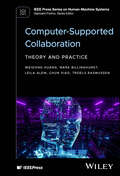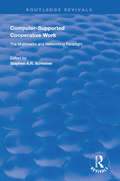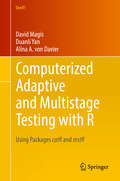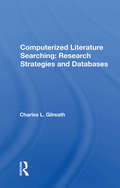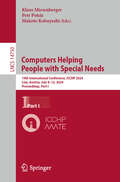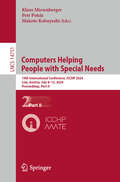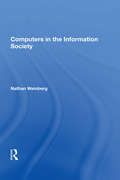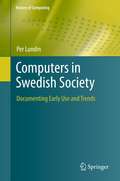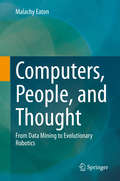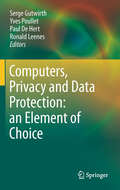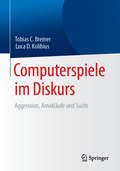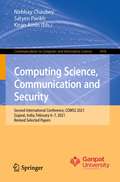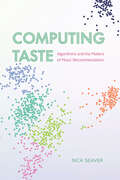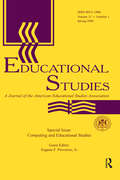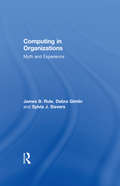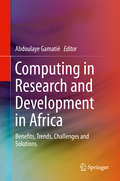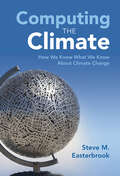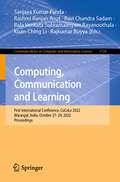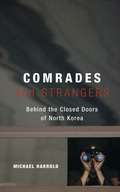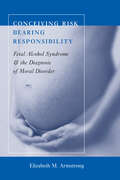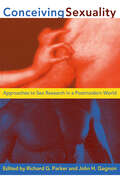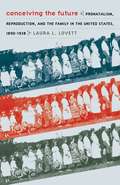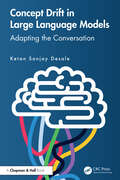- Table View
- List View
Computer-Supported Collaboration: Theory and Practice (IEEE Press Series on Human-Machine Systems)
by Weidong Huang Leila Alem Mark Billinghurst Chun Xiao Troels RasmussenDiscover the latest developments in AR, VR, mobile, and wearable technologies for the remote guidance of physical tasks In Computer-Supported Collaboration: Theory and Practice, an expert team of researchers delivers the latest instruction in using augmented reality (AR), virtual reality (VR), and mobile or wearable technology to support remote guidance on physical tasks. The authors offer an overview of the field before moving on to discuss state-of-the-art research developments in everything from shared visual spaces to the use of hand gestures and gaze information for better collaboration. The book also describes the hardware devices, software tools, and libraries that can be used to help build remote guidance systems, as well as the industrial systems and applications that have been used in real world settings. Finally, Computer-Supported Collaboration includes a discussion of the current challenges faced by practitioners in the field and likely future directions for new research and development. Readers will also discover: A thorough introduction and review of the art of remote guidance research and engineering Comprehensive explorations of the shared visual space used to support common grounding and the remote guidance of physical tasks, as well as mobility support for local workers Practical discussions of mobility support of workers and helpers in remote guidance, including systems that support hands-free interaction In-depth explorations of communication cues in remote guidance, including systems that support gesturing and sketching on a touch-based display Perfect for researchers and professionals working in human-computer interaction or computer-supported collaborative work, Computer-Supported Collaboration: Theory and Practice is also an ideal resource for educators and graduate students teaching or studying in these fields.
Computer-supported Cooperative Work (Routledge Revivals)
by Stephen A.R. ScrivenerPublished in 1994, this work supplies an up-to-date view of Computer-Supported Cooperative Work (CSCW) and its role in empowering groups to achieve better solutions faster. The enabling technology and group organizational and behavioural aspects of CSCW should be of interest to a wide audience.
Computerized Adaptive and Multistage Testing with R: Using Packages catR and mstR (Use R!)
by Duanli Yan David Magis Alina A. von DavierThe goal of this guide and manual is to provide a practical and brief overview of the theory on computerized adaptive testing (CAT) and multistage testing (MST) and to illustrate the methodologies and applications using R open source language and several data examples. Implementation relies on the R packages catR and mstR that have been already or are being developed by the first author (with the team) and that include some of the newest research algorithms on the topic. The book covers many topics along with the R-code: the basics of R, theoretical overview of CAT and MST, CAT designs, CAT assembly methodologies, CAT simulations, catR package, CAT applications, MST designs, IRT-based MST methodologies, tree-based MST methodologies, mstR package, and MST applications. CAT has been used in many large-scale assessments over recent decades, and MST has become very popular in recent years. R open source language also has become one of the most useful tools for applications in almost all fields, including business and education. Though very useful and popular, R is a difficult language to learn, with a steep learning curve. Given the obvious need for but with the complex implementation of CAT and MST, it is very difficult for users to simulate or implement CAT and MST. Until this manual, there has been no book for users to design and use CAT and MST easily and without expense; i. e. , by using the free R software. All examples and illustrations are generated using predefined scripts in R language, available for free download from the book's website.
Computerized Literature Searching: Research Strategies And Databases
by Charles L. GilreathThe computer terminal is well on its way to being as commonplace as the telephone, and its usefulness to the scholar and scientist is so great that already computer screens and disks are seen frequently in academic offices. The value of computers in research is well established, with vast amounts of data being processed daily by all sizes of computers. Computers also have had dramatic effects on the researcher's literature-searching options: Scientists and scholars can now query enormous databases containing tens of millions of citations to published literature and can extract bibliographies tailored to their specific questions. The power and flexibility afforded the user of information by these literature-searching systems ease the burden of library work, but in order to use the systems effectively, it is necessary to understand both their capabilities and their limitations. Mr. Gilreath describes the principles underlying online bibliographic systems, the databases available, and the factors a researcher must consider in using them. He explores in some depth the relationship of the structure and terminology of publications in various fields to the literature-searching process and provides detailed guidelines for research in the life, health, agricultural, and social sciences, chemistry, physics, mathematics, geology, meteorology, engineering, education, psychology, business, law, current affairs, and the humanities. A glossary of literature-searching terms is included.
Computers Helping People with Special Needs: 19th International Conference, ICCHP 2024, Linz, Austria, July 8–12, 2024, Proceedings, Part I (Lecture Notes in Computer Science #14750)
by Klaus Miesenberger Petr Peňáz Makoto KobayashiThe two-volume set LNCS 14750 and 14751 constitutes the refereed proceedings of the International Conference on Computers Helping People with Special Needs, ICCHP 2024, which took place in Linz, Austria, during July 8-12, 2024. The 104 full papers included in the proceedings were carefully reviewed and selected from a total of 266 submission. They were organized in topical sections as follows: Part I: Software, Web and document accessibility; making entertainment content more inclusive; art Karshmer lectures in access to mathemtaics, science and engineering; tactile graphics and 3D models for blind people and shape recognition by touch; new methods for creating accessible material in higher education; ICT to support inclusive education - universal learning design (ULD); blind and low vision: orientation and mobility; blindness, low vision: new approaches to perception and ICT mediation; Part II: Accessibility for the deaf and hard-of-hearing; interaction techniques for motor disabled users; augmentative and alternative communication innovations in products and services, cognitive disabilities, assistive technologies and accessibility; dyslexia, reading/writing disorders: assistive technology and accessibility; accessible, smart, and integrated healthcare systems for elderly and disabled people; assistive technologies and inclusion for older people; advanced technologies for innovating inclusing and participation in labour, education, and everyday life; disability, inclusion, service provision, policy and legislation.
Computers Helping People with Special Needs: 19th International Conference, ICCHP 2024, Linz, Austria, July 8–12, 2024, Proceedings, Part II (Lecture Notes in Computer Science #14751)
by Klaus Miesenberger Petr Peňáz Makoto KobayashiThe two-volume set LNCS 14750 and 14751 constitutes the refereed proceedings of the International Conference on Computers Helping People with Special Needs, ICCHP 2024, which took place in Linz, Austria, during July 8-12, 2024. The 104 full papers included in the proceedings were carefully reviewed and selected from a total of 266 submission. They were organized in topical sections as follows: Part I: Software, Web and document accessibility; making entertainment content more inclusive; art Karshmer lectures in access to mathemtaics, science and engineering; tactile graphics and 3D models for blind people and shape recognition by touch; new methods for creating accessible material in higher education; ICT to support inclusive education - universal learning design (ULD); blind and low vision: orientation and mobility; blindness, low vision: new approaches to perception and ICT mediation; Part II: Accessibility for the deaf and hard-of-hearing; interaction techniques for motor disabled users; augmentative and alternative communication innovations in products and services, cognitive disabilities, assistive technologies and accessibility; dyslexia, reading/writing disorders: assistive technology and accessibility; accessible, smart, and integrated healthcare systems for elderly and disabled people; assistive technologies and inclusion for older people; advanced technologies for innovating inclusing and participation in labour, education, and everyday life; disability, inclusion, service provision, policy and legislation.
Computers In The Information Society
by Nathan WeinbergThis book examines the unfolding cultural and organizational impact of computers on human society. Through this analysis, it discusses the role of information technology in people's lives, interdependence between the society and its computer creations, and expectations in the information society.
Computers in Swedish Society: Documenting Early Use and Trends (History of Computing)
by Per LundinThis book reviews the shift in the historiography of computing from inventors and innovations to a user-perspective, and examines how the relevant sources can be created, collected, preserved, and disseminated. The text describes and evaluates a project in Sweden that documented the stories of around 700 people. The book also provides a critical discussion on the interpretation of oral evidence, presenting three case studies on how this evidence can inform us about the interaction of computing with large-scale transformations in economies, cultures, and societies. Features: describes a historiography aimed at addressing the question of how computing shaped and transformed Swedish society between 1950 and 1980; presents a user-centered perspective on the history of computing, after explaining the benefits of such an approach; examines the documentation of users, describing novel and innovative documentation methods; discusses the pros and cons of collaborative projects between academia and industry.
Computers, People, and Thought: From Data Mining to Evolutionary Robotics
by Malachy EatonIn this book the author discusses synergies between computers and thought, related to the field of Artificial Intelligence; between people and thought, leading to questions of consciousness and our existence as humans; and between computers and people, leading to the recent remarkable advances in the field of humanoid robots. He then looks toward the implications of intelligent 'conscious' humanoid robots with superior intellects, able to operate in our human environments. After presenting the basic engineering components and supporting logic of computer systems, and giving an overview of the contributions of pioneering scientists in the domains of computing, logic, and robotics, in the core of the book the author examines the meaning of thought and intelligence in the context of specific tasks and successful AI approaches. In the final part of the book he introduces related societal and ethical implications.The book will be a useful accompanying text in courses on artificial intelligence, robotics, intelligent systems, games, and evolutionary computing. It will also be valuable for general readers and historians of technology.
Computers, Privacy and Data Protection: An Element Of Choice
by Paul De Hert Yves Poullet Serge Gutwirth Ronald LeenesThis timely interdisciplinary work on current developments in ICT and privacy/data protection, coincides as it does with the rethinking of the Data Protection Directive, the contentious debates on data sharing with the USA (SWIFT, PNR) and the judicial and political resistance against data retention. The authors of the contributions focus on particular and pertinent issues from the perspective of their different disciplines which range from the legal through sociology, surveillance studies and technology assessment, to computer sciences. Such issues include cutting-edge developments in the field of cloud computing, ambient intelligence and PETs; data retention, PNR-agreements, property in personal data and the right to personal identity; electronic road tolling, HIV-related information, criminal records and teenager's online conduct, to name but a few.
Computerspiele im Diskurs: Aggression, Amokläufe und Sucht
by Tobias C. Breiner Luca D. KolibiusDieses Fachbuch ist eine umfassende Abhandlung zur Debatte um die negativen Auswirkungen von Computerspielen: Aggressionen, Amokläufe und Sucht. Die kontroverse Debatte zur Beziehung zwischen Computerspielen und Aggression wird hier auf Grundlage neuster wissenschaftlicher Erkenntnisse aufgearbeitet. Darüber hinaus inspirierte die Aufnahme in die aktuellste Version des Klassifikationssystems DSM für Internet Gaming Disorder (Computerspielsucht) eine Vielzahl wissenschaftlicher Veröffentlichungen, welche hier übersichtlich zusammengetragen werden. In diesem Buch finden Sie die Antworten auf folgende Fragen: Welche Symptome machen eine Computerspielabhängigkeit aus und welche Therapiemöglichkeiten gibt es?Geht Computerspielsucht mit Veränderungen im Gehirn und der Persönlichkeit einher?Gibt es eine kausale Beziehung zwischen Computerspielen einerseits und Aggressivität und Amokläufen andererseits? Die Autoren kommen dabei nach Sichtung der Studienlage zu überraschenden Erkenntnissen. Dieses Buch unterstützt Psychologen, Psychotherapeuten, Psychiater, Pädagogen, Therapeuten, Lehrkräfte und Eltern die Welt der Computerspiele zu navigieren.
Computing Science, Communication and Security: Second International Conference, COMS2 2021, Gujarat, India, February 6–7, 2021, Revised Selected Papers (Communications in Computer and Information Science #1416)
by Nirbhay Chaubey Satyen Parikh Kiran AminThis book constitutes revised selected papers of the Second International Conference on Computing Science, Communication and Security, COMS2 2021, held in Gandhinagar, India, in February 2021. Due to the COVID-19 pandemic the conference was held virtually. The 19 full papers were thoroughly reveiwed and selected from 105 submissions. Papers are organised according to the topical sections on artificial intelligence and machine learning; networking and communications.
Computing Taste: Algorithms and the Makers of Music Recommendation
by Nick SeaverMeet the people who design the algorithms that capture our musical tastes. The people who make music recommender systems have lofty goals: they want to broaden listeners’ horizons and help obscure musicians find audiences, taking advantage of the enormous catalogs offered by companies like Spotify, Apple Music, and Pandora. But for their critics, recommender systems seem to embody all the potential harms of algorithms: they flatten culture into numbers, they normalize ever-broadening data collection, and they profile their users for commercial ends. Drawing on years of ethnographic fieldwork, anthropologist Nick Seaver describes how the makers of music recommendation navigate these tensions: how product managers understand their relationship with the users they want to help and to capture; how scientists conceive of listening itself as a kind of data processing; and how engineers imagine the geography of the world of music as a space they care for and control. Computing Taste rehumanizes the algorithmic systems that shape our world, drawing attention to the people who build and maintain them. In this vividly theorized book, Seaver brings the thinking of programmers into conversation with the discipline of anthropology, opening up the cultural world of computation in a wide-ranging exploration that travels from cosmology to calculation, myth to machine learning, and captivation to care.
Computing Taste: Algorithms and the Makers of Music Recommendation
by Nick SeaverMeet the people who design the algorithms that capture our musical tastes. The people who make music recommender systems have lofty goals: they want to broaden listeners’ horizons and help obscure musicians find audiences, taking advantage of the enormous catalogs offered by companies like Spotify, Apple Music, and Pandora. But for their critics, recommender systems seem to embody all the potential harms of algorithms: they flatten culture into numbers, they normalize ever-broadening data collection, and they profile their users for commercial ends. Drawing on years of ethnographic fieldwork, anthropologist Nick Seaver describes how the makers of music recommendation navigate these tensions: how product managers understand their relationship with the users they want to help and to capture; how scientists conceive of listening itself as a kind of data processing; and how engineers imagine the geography of the world of music as a space they care for and control. Computing Taste rehumanizes the algorithmic systems that shape our world, drawing attention to the people who build and maintain them. In this vividly theorized book, Seaver brings the thinking of programmers into conversation with the discipline of anthropology, opening up the cultural world of computation in a wide-ranging exploration that travels from cosmology to calculation, myth to machine learning, and captivation to care.
Computing Taste: Algorithms and the Makers of Music Recommendation
by Nick SeaverMeet the people who design the algorithms that capture our musical tastes. The people who make music recommender systems have lofty goals: they want to broaden listeners’ horizons and help obscure musicians find audiences, taking advantage of the enormous catalogs offered by companies like Spotify, Apple Music, and Pandora. But for their critics, recommender systems seem to embody all the potential harms of algorithms: they flatten culture into numbers, they normalize ever-broadening data collection, and they profile their users for commercial ends. Drawing on years of ethnographic fieldwork, anthropologist Nick Seaver describes how the makers of music recommendation navigate these tensions: how product managers understand their relationship with the users they want to help and to capture; how scientists conceive of listening itself as a kind of data processing; and how engineers imagine the geography of the world of music as a space they care for and control. Computing Taste rehumanizes the algorithmic systems that shape our world, drawing attention to the people who build and maintain them. In this vividly theorized book, Seaver brings the thinking of programmers into conversation with the discipline of anthropology, opening up the cultural world of computation in a wide-ranging exploration that travels from cosmology to calculation, myth to machine learning, and captivation to care.
Computing and Educational Studies: A Special Issue of educational Studies (Counterpoints Ser. #123)
by Jr. Eugene F. ProvenzoThis special issue calls for a greater awareness of computing as a critical area of study for those interested in educational studies. Its purpose is to open up a wider dialogue about computing and education than has previously existed in the field. The questions raised provide the basis for a lively discussion and analysis of the role of educational studies in interpreting the role of computing in our culture and educational system. This issue also provides a model for exploring other topics of similar significance and importance to the field in future issues of the journal.
Computing in Organizations: Myth and Experience
by Debra Gimlin"Is any image in modern times more evocative of social change than the computer? Popular mythology ascribes extraordinary powers to computers in the ordering of human affairs. Computers are seen as instruments of social transformation and economic change. Indeed, it is hard not to find computers in the modern workplace, let alone in the home. They are ubiquitous in government offices, businesses large and small alike, the school, and not-for-profit organizations. In this meticulously researched study of computers and computing, authors James B. Rule, Debra Gimlin, and Sylvia Sievers present a fascinating, entertaining, and thought-provoking survey of the use of what may be the most powerful tool in today's workplace. In the chapter entitled ""The New York Study: Design and Execution,"" the authors describe their inspiration for the undertaking of their study, how they designed their research methods, and how they obtained funding for the project. In the chapter ""What Computers Do; How Computing Changes,"" case studies involving businesses that adopted greater computer usage are described, and the authors explain how the new technology was employed for their benefit. In ""Employment and Efficiency"" time saving and cost-effectiveness qualities of computer technology are explored. And in ""Management and Structure,"" the authors posit the role of the computer in organizational transformation. Computing in Organizations is a timely and relevant work, and will prove of great benefit to strategic consultants, business management personnel, sociologists, and students of information technology."
Computing in Research and Development in Africa: Benefits, Trends, Challenges and Solutions
by Abdoulaye GamatiéThis book describes the trends, challenges and solutions in computing use for scientific research and development within different domains in Africa, such as health, agriculture, environment, economy, energy, education and engineering. The benefits expected are discussed by a number of recognized, domain-specific experts, with a common theme being computing as solution enabler. This book is the first document providing such a representative up-to-date view on this topic at the continent level.
Computing the Climate: How We Know What We Know About Climate Change
by Steve M. EasterbrookHow do we know that climate change is an emergency? How did the scientific community reach this conclusion all but unanimously, and what tools did they use to do it? This book tells the story of climate models, tracing their history from nineteenth-century calculations on the effects of greenhouse gases, to modern Earth system models that integrate the atmosphere, the oceans, and the land using the full resources of today's most powerful supercomputers. Drawing on the author's extensive visits to the world's top climate research labs, this accessible, non-technical book shows how computer models help to build a more complete picture of Earth's climate system. 'Computing the Climate' is ideal for anyone who has wondered where the projections of future climate change come from – and why we should believe them.
Computing, Communication and Learning: First International Conference, CoCoLe 2022, Warangal, India, October 27–29, 2022, Proceedings (Communications in Computer and Information Science #1729)
by Rajkumar Buyya Kuan-Ching Li Sanjaya Kumar Panda Rashmi Ranjan Rout Ravi Chandra Sadam Bala Venkata Subramaanyam RayanoothalaThis volume constitutes the refereed proceedings of the First International Conference on Computing, Communication and Learning, CoCoLe 2022, held in Warangal, India, in October 2022.The 25 full papers and 1 short paper presented were carefully reviewed and selected from 117 submissions. The CoCoLe conference focuses on three broad areas of computer science and other allied branches, namely computing, communication, and learning.
Comrades and Strangers: Behind the Closed Doors of North Korea
by Michael HarroldIn 1986, Harrold accepted a job as the language adviser for English translations of speeches by Kim Il Sung, causing him to become the first Briton to live in North Korea. In this memoir of his seven-year sojourn, he describes his experiences meeting North Koreans from high state officials to farmers working in paddy fields. Even though he eventually got into trouble with state authorities, he still defended the country against the threat of US aggression. Annotation ©2006 Book News, Inc., Portland, OR (booknews.com)
Conceiving Risk, Bearing Responsibility: Fetal Alcohol Syndrome and the Diagnosis of Moral Disorder
by Elizabeth M. ArmstrongIn American society, the consumption of alcohol during pregnancy is considered dangerous, irresponsible, and in some cases illegal. Pregnant women who have even a single drink routinely face openly voiced reproach. Yet fetal alcohol syndrome (FAS) in infants and children is notoriously difficult to diagnose, and the relationship between alcohol and adverse birth outcomes is riddled with puzzles and paradoxes. Sociologist Elizabeth M. Armstrong uses fetal alcohol syndrome and the problem of drinking during pregnancy to examine the assumed relationship between somatic and social disorder, the ways in which social problems are individualized, and the intertwining of health and morality that characterizes American society. She traces the evolution of medical knowledge about the effects of alcohol on fetal development, from nineteenth-century debates about drinking and heredity to the modern diagnosis of FAS and its kindred syndromes. She argues that issues of race, class, and gender have influenced medical findings about alcohol and reproduction and that these findings have always reflected broader social and moral preoccupations and, in particular, concerns about women's roles and place in society, as well as the fitness of future generations. Medical beliefs about drinking during pregnancy have often ignored the poverty, chaos, and insufficiency of some women's lives—factors that may be more responsible than alcohol for adverse outcomes in babies and children. Using primary sources and interviews to explore relationships between doctors and patients and women and their unborn children, Armstrong offers a provocative and detailed analysis of how drinking during pregnancy came to be considered a pervasive social problem, despite the uncertainties surrounding the epidemiology and etiology of fetal alcohol syndrome.
Conceiving Sexuality: Approaches to Sex Research in a Postmodern World
by Richard G. Parker John H. GagnonFirst Published in 1995. Routledge is an imprint of Taylor & Francis, an informa company.
Conceiving the Future
by Laura L. LovettThrough nostalgic idealizations of motherhood, family, and the home, influential leaders in early twentieth-century America constructed and legitimated a range of reforms that promoted human reproduction. Their pronatalism emerged from a modernist conviction that reproduction and population could be regulated. European countries sought to regulate or encourage reproduction through legislation; America, by contrast, fostered ideological and cultural ideas of pronatalism through what Laura Lovett calls "nostalgic modernism," which romanticized agrarianism and promoted scientific racism and eugenics. Lovett looks closely at the ideologies of five influential American figures: Mary Lease's maternalist agenda, Florence Sherbon's eugenic "fitter families" campaign, George Maxwell's "homecroft" movement of land reclamation and home building, Theodore Roosevelt's campaign for conservation and country life, and Edward Ross's sociological theory of race suicide and social control. Demonstrating the historical circumstances that linked agrarianism, racism, and pronatalism, Lovett shows how reproductive conformity was manufactured, how it was promoted, and why it was coercive. In addition to contributing to scholarship in American history, gender studies, rural studies, and environmental history, Lovett's study sheds light on the rhetoric of "family values" that has regained currency in recent years.
Concept Drift in Large Language Models: Adapting the Conversation
by Ketan Sanjay DesaleThis book explores the application of the complex relationship between concept drift and cutting-edge large language models to address the problems and opportunities in navigating changing data landscapes. It discusses the theoretical basis of concept drift and its consequences for large language models, particularly the transformative power of cutting-edge models such as GPT-3.5 and GPT-4. It offers real-world case studies to observe firsthand how concept drift influences the performance of language models in a variety of circumstances, delivering valuable lessons learnt and actionable takeaways. The book is designed for professionals, AI practitioners, and scholars, focused on natural language processing, machine learning, and artificial intelligence.• Examines concept drift in AI, particularly its impact on large language models• Analyses how concept drift affects large language models and its theoretical and practical consequences• Covers detection methods and practical implementation challenges in language models• Showcases examples of concept drift in GPT models and lessons learnt from their performance• Identifies future research avenues and recommendations for practitioners tackling concept drift in large language models
